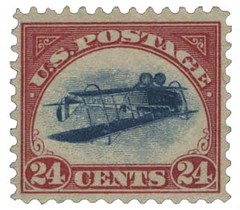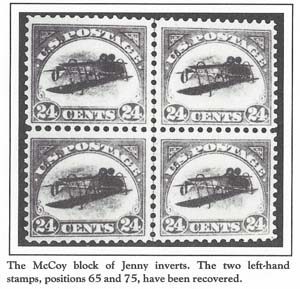
PREV ARTICLE
NEXT ARTICLE
FULL ISSUE
PREV FULL ISSUE
STOLEN INVERTED JENNY STAMP REAPPEARS
Bill Rosenblum forwarded this story about the recovery of a long-lost "inverted Jenny" stamp. As Bill notes, it's "not
numismatic, but the story is similar to an extremely rare coin that turns up after 60 years." -Editor
Six decades after four of the U.S. Postal Service's most celebrated misprints were brashly stolen from a collectors' convention, one of the missing "inverted Jenny" stamps surfaced this month at a New York auction house. The 1918 stamps, featuring an airplane printed upside-down, are among the world's most famous pieces of postage. "It's one of the most notorious crimes in philatelic history, and there's a piece of the puzzle now that's in place," said Scott English, the administrator of the American Philatelic Research Library, which owns the stamp. It was submitted to auctioneer Spink USA by a man from the United Kingdom who had inherited it from his grandfather and said he didn't know much about it, said George Eveleth, head of the Spink USA philatelic department. Authenticators determined it was not only a genuine Jenny - one of only 100 ever sold - but also one of the four from the 1955 heist. The philatelic library is now working with Spink USA and federal authorities to reclaim the stamp. The FBI didn't immediately respond to a request for comment. Eveleth said authorities had told the auctioneers not to release the name of the consigner, who is in his 20s, and it's unclear whether he has an attorney who could comment on the developments. There has been no sign of any of the four stolen Jenny stamps in over 30 years, since two others were recovered in the 1980s and '70s. The whereabouts of the fourth are still unknown. While it's unclear whether the would-be consigner can shed any light on the long-cold trail to the thieves, the stamp was accompanied by an intriguing item: a 1965 letter about a monetary loan from a noted stamp dealer to a well-known auctioneer, both now dead, Eveleth said. The letter isn't necessarily connected to this stamp, however. Still, the Bellefonte, Pennsylvania-based philatelic library hopes the stamp's discovery could lead to new clues. "We're going to remain optimistic," English said. "Because think about it: Here we are, 61 years later, and a stamp has appeared." Worth 24 cents when issued, inverted Jenny stamps fetch hundreds of thousands of dollars today. While other stamps are rarer, the Jenny is one of few that is readily recognized even by non-collectors, Eveleth said. To celebrate the launch of U.S. air mail, the Postal Service designed a stamp featuring a Curtiss JN-4H "Jenny" biplane. Some were printed with the plane inverted, and a savvy customer bought a 100-stamp sheet before anyone realized the error. Over the years, they were separated, coveted, counterfeited, stolen on more than one occasion and narrowly saved from the blitzkrieg of London in World War II and from a flood in Wilkes-Barre, Pennsylvania. Ethel B. Stewart McCoy, a New York heiress and stamp enthusiast, lent her block of four Jenny stamps to the American Philatelic Society - a separate organization that shares some ties with the American Philatelic Research Library - to exhibit at a 1955 convention in Norfolk, Virginia, where the stamps were stolen from a display case. Two were recovered in the '70s and '80s from different Chicago stamp connoisseurs, who said they'd bought the stamps from people who had since died or whose names they didn't know, according to a 2014 article in American Philatelist, the society's journal. Those stamps went to the philatelic library, as McCoy had given it rights to all her stolen Jenny stamps before her 1980 death. To read the complete article, see:
The Associated Press story glossed over how this particular stamp was positively identified. There's more information on the Spink
USA web site. -Editor
After the theft, the block was broken into four singles, and each copy was altered to disguise its appearance. Position 76 recovered by Spink had been reperforated at right and most of the gum was removed, so the pencil position numbers written on the gummed side had been lost, making identification a challenge. 1979 Ms. McCoy assigned all her rights to the block to the American Philatelic Research Library at the American Philatelic Society. Position 75, the top left stamp, turned up in 1958 at a Chicago stamp and coin dealer's shop and position 65, the bottom left stamp, was recovered in 1982.
Kudos to all involved - great detective work. It's good to see that even after so many years a stolen item can be properly identified
and may be returned to its legal owners. -Editor
To read the complete article, see:
Wayne Homren, Editor The Numismatic Bibliomania Society is a non-profit organization promoting numismatic literature. See our web site at coinbooks.org. To submit items for publication in The E-Sylum, write to the Editor at this address: whomren@gmail.com To subscribe go to: https://my.binhost.com/lists/listinfo/esylum All Rights Reserved. NBS Home Page Contact the NBS webmaster 
|

